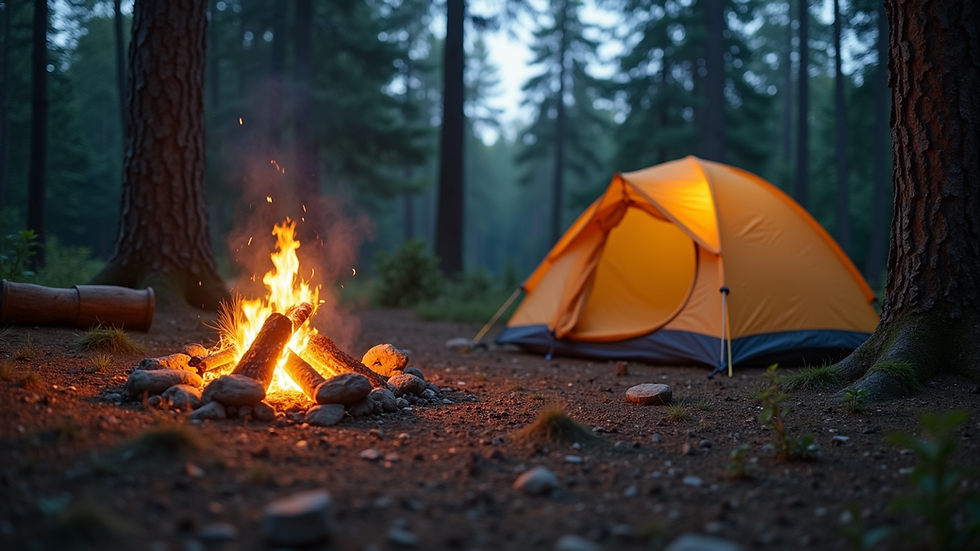Top 10 Survival Tips for Wilderness Adventures
- urwhatyouread
- Aug 9, 2025
- 3 min read
Wilderness adventures can be thrilling, but they also come with risks. Whether you are hiking through dense forests, camping under the stars, or exploring remote areas, knowing how to survive in the wild is crucial. This blog post will share the top 10 survival tips that can help you stay safe and enjoy your adventure to the fullest.
1. Know Your Environment
Before you head out, take time to learn about the area you will be exploring.
Research the terrain: Understand the landscape, weather patterns, and potential hazards.
Wildlife awareness: Know what animals you might encounter and how to react if you see them.
Being informed can help you avoid dangerous situations.
2. Pack the Essentials
Packing the right gear can make a big difference in your survival.
Water: Always carry enough water or a reliable way to purify it.
Food: Bring non-perishable snacks like nuts, energy bars, or dried fruits.
First aid kit: Include bandages, antiseptics, and any personal medications.
Navigation tools: A map and compass or a GPS device can help you find your way.
Having these essentials can keep you safe and comfortable.
3. Build a Shelter
If you find yourself in a situation where you need to stay overnight, knowing how to build a shelter is vital.
Natural materials: Use branches, leaves, and other natural materials to create a temporary shelter.
Location: Choose a spot away from hazards like falling branches or flooding.
A good shelter can protect you from the elements and keep you warm.
4. Start a Fire
Fire is essential for warmth, cooking, and signaling for help.
Gather materials: Collect dry leaves, twigs, and larger logs.
Fire-starting tools: Carry waterproof matches, a lighter, or a fire starter.
Knowing how to start a fire can be a lifesaver in the wilderness.
5. Signal for Help
If you find yourself lost or in trouble, signaling for help is crucial.
Visual signals: Use bright colors or reflective materials to attract attention.
Sound signals: Whistles or shouting can help others locate you.
Being able to signal for help can increase your chances of being rescued.
6. Stay Calm and Think Clearly
Panic can lead to poor decisions.
Breathe deeply: Take a moment to calm yourself.
Assess your situation: Determine what resources you have and what your next steps should be.
Staying calm can help you think clearly and make better choices.
7. Learn Basic First Aid
Knowing how to treat minor injuries can be very helpful.
Wound care: Learn how to clean and dress wounds properly.
CPR: Basic CPR skills can save a life in emergencies.
Having first aid knowledge can empower you to handle injuries effectively.
8. Understand the Weather
Weather can change quickly in the wilderness.
Check forecasts: Before you leave, check the weather forecast for your area.
Recognize signs: Learn to read the sky and recognize signs of changing weather.
Understanding the weather can help you prepare for unexpected conditions.
9. Stay Hydrated
Water is essential for survival.
Drink regularly: Even if you do not feel thirsty, drink water regularly.
Purification methods: Know how to purify water from natural sources.
Staying hydrated can keep your energy levels up and help you think clearly.
10. Trust Your Instincts
Your instincts can be a powerful tool in the wilderness.
Listen to your gut: If something feels wrong, trust your feelings.
Adapt to your surroundings: Be flexible and ready to change your plans if necessary.
Trusting your instincts can help you navigate challenges effectively.
Wilderness adventures can be incredibly rewarding, but they require preparation and knowledge. By following these survival tips, you can enhance your experience and ensure your safety.
Remember, the key to enjoying the great outdoors is being prepared and staying aware of your surroundings. With the right mindset and skills, you can turn any wilderness adventure into a memorable experience.

As you embark on your next adventure, keep these tips in mind. They can make all the difference between a fun outing and a challenging situation. Happy exploring!




Comments